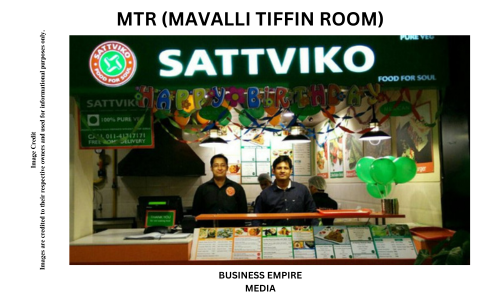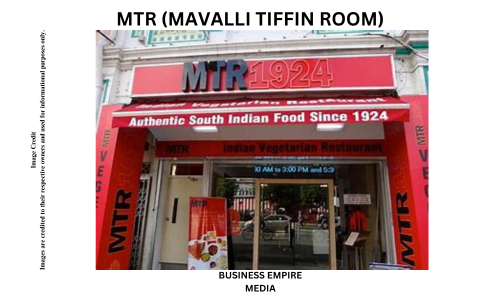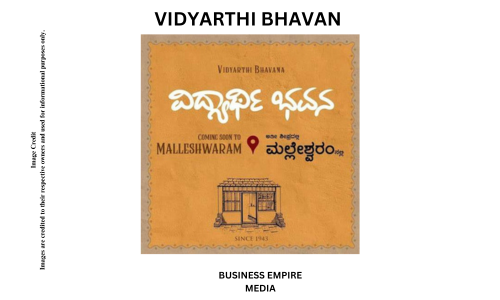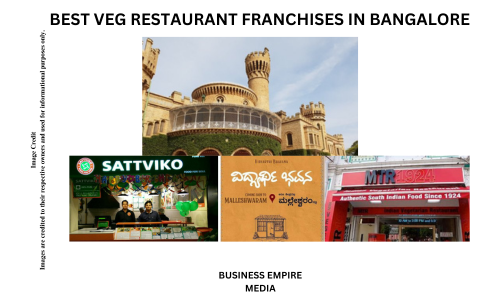Bangalore, renowned for its diverse culinary landscape, is a city where vegetarian restaurants thrive alongside a variety of cuisines. For entrepreneurs looking to invest in the food industry, vegetarian restaurant franchises offer a promising opportunity.
Here’s a guide to some of the best veg restaurant franchises in Bangalore that combine quality, brand recognition, and a strong market presence.
1. Sattviko

Introduction:
Sattviko is a leading name in the vegetarian restaurant sector, known for its unique fusion of traditional Indian and modern cuisine. With a commitment to delivering healthy and wholesome food, Sattviko offers a vibrant dining experience that appeals to health-conscious diners and food enthusiasts alike. The brand has successfully carved out a niche in the market with its innovative menu and contemporary ambiance.
Famous For:
Sattviko is celebrated for its creative take on traditional Indian dishes. The restaurant’s menu features a range of popular and health-focused items, including:
- Paneer Tikka: Marinated and grilled to perfection.
- Chole Bhature: A classic North Indian favorite with a modern twist.
- Stuffed Parathas: Flavorful and nutritious, with a variety of fillings.
- Salads and Smoothies: Fresh and made from high-quality ingredients.
Franchise Model:
Sattviko offers a comprehensive franchise model designed to support and guide franchisees through every stage of their business journey. The franchise package includes:
- Site Selection and Restaurant Setup: Assistance in choosing the right location and setting up the restaurant according to brand standards.
- Training: Detailed training programs for staff on food preparation, service standards, and operational procedures.
- Marketing Support: Strategies and materials to promote the franchise and attract customers.
- Operational Support: Ongoing support in managing day-to-day operations, including inventory management and quality control.
Investment Required:
The initial investment for a Sattviko franchise ranges from INR 25-30 lakhs. This investment covers:
- Franchise Fee: Includes the cost of using the Sattviko brand and its proprietary systems.
- Restaurant Setup: Costs related to interior design, equipment, and initial inventory.
- Training and Marketing: Expenses for franchisee training and initial marketing efforts.
Space Required:
A typical Sattviko restaurant requires a space of approximately 1,000 to 1,500 square feet. This includes:
- Dining Area: Designed to create a vibrant and welcoming atmosphere.
- Kitchen: Equipped to handle the preparation of a diverse menu.
- Storage: Adequate space for storing ingredients and supplies.
2. MTR (Mavalli Tiffin Room)

Introduction:
MTR (Mavalli Tiffin Room) is an iconic name in South Indian cuisine, with a legacy that dates back to 1924. Known for its traditional and authentic dishes, MTR has become synonymous with quality South Indian food. The restaurant has a rich history and has earned a reputation for delivering consistently delicious and flavorful meals, making it a beloved choice for both locals and visitors.
Famous For:
MTR is renowned for its classic South Indian offerings, which include:
- Dosa: Crispy and golden, served with an array of chutneys and sambar.
- Idli: Soft and fluffy, paired with aromatic sambar and chutneys.
- Vada: Crispy and savory, enjoyed as a snack or part of a meal.
- MTR Special Thali: A wholesome meal that includes a variety of traditional dishes, showcasing the rich flavors of South Indian cuisine.
Franchise Model:
MTR offers a structured and comprehensive franchise model, including:
- Site Selection and Setup: Assistance in choosing a suitable location and setting up the restaurant to meet MTR’s high standards.
- Training: In-depth training programs for staff on food preparation, customer service, and operational procedures, ensuring consistency with MTR’s established practices.
- Marketing Support: Guidance and materials for local marketing efforts to attract and retain customers.
- Operational Support: Ongoing support in managing the restaurant, including quality control, inventory management, and customer service.
Investment Required:
The initial investment for an MTR franchise is estimated to be around INR 30-40 lakhs. This investment covers:
- Franchise Fee: Payment for using the MTR brand and its proprietary systems.
- Restaurant Setup: Costs related to interior design, kitchen equipment, and initial stock.
- Training and Marketing: Expenses for franchisee training and initial marketing activities.
Space Required:
A typical MTR restaurant requires a space of approximately 1,200 to 2,000 square feet. This space includes:
- Dining Area: Designed to accommodate a significant number of guests and create a traditional dining atmosphere.
- Kitchen: Equipped to handle the preparation of a variety of South Indian dishes.
- Storage: Adequate space for storing ingredients and supplies
3. Vidyarthi Bhavan

Introduction:
Vidyarthi Bhavan is a legendary name in South Indian cuisine, particularly famous for its authentic and traditional vegetarian meals. Established in 1943, this iconic eatery has garnered a loyal following due to its delicious, home-style cooking and nostalgic charm. Vidyarthi Bhavan is celebrated for maintaining high standards of quality and consistency, making it a cherished dining destination.
Famous For:
Vidyarthi Bhavan is renowned for its classic South Indian dishes, which include:
- Crispy Dosas: Thin, crispy dosas served with a variety of chutneys and sambar.
- Idlis: Soft, fluffy idlis that pair perfectly with sambar and chutneys.
- Vadas: Savory, crispy vadas enjoyed as a snack or part of a meal.
- Traditional Thalis: Wholesome meals featuring a range of South Indian delicacies.
Franchise Model:
Vidyarthi Bhavan offers a well-established franchise model with the following features:
- Site Selection and Restaurant Setup: Guidance in selecting an appropriate location and setting up the restaurant to reflect Vidyarthi Bhavan’s traditional and authentic style.
- Training: Comprehensive training programs for staff, covering food preparation, customer service, and restaurant operations to ensure consistency with the brand’s standards.
- Marketing Support: Support with marketing strategies and materials to promote the franchise and attract customers.
- Operational Support: Ongoing assistance in managing day-to-day operations, maintaining quality control, and optimizing inventory management.
Investment Required:
The initial investment for a Vidyarthi Bhavan franchise is estimated to be around INR 20-30 lakhs. This investment includes:
- Franchise Fee: The cost for acquiring the rights to use the Vidyarthi Bhavan brand and systems.
- Restaurant Setup: Expenses related to interior design, kitchen equipment, and initial stock.
- Training and Marketing: Costs for franchisee training and initial marketing efforts.
Space Required:
A typical Vidyarthi Bhavan restaurant requires a space of approximately 1,000 to 1,500 square feet. This space includes:
- Dining Area: Designed to accommodate a significant number of guests and create a nostalgic, traditional dining atmosphere.
- Kitchen: Fully equipped to handle the preparation of a variety of South Indian dishes.
- Storage: Adequate space for storing ingredients and supplies.
4. Rim Naam
Introduction:
Rim Naam is a distinguished name in the vegetarian dining scene, specializing in exquisite North Indian cuisine. Known for its elegant ambiance and high-quality dishes, Rim Naam offers a unique dining experience that combines traditional flavors with contemporary presentation. The restaurant has earned a reputation for excellence and a refined approach to North Indian cuisine, making it a popular choice among food enthusiasts.
Famous For:
Rim Naam is renowned for its sophisticated North Indian dishes, which include:
- Paneer Lababdar: A rich and creamy curry featuring succulent paneer cubes.
- Dal Makhani: A classic dish of slow-cooked black lentils in a flavorful, creamy sauce.
- Stuffed Naan: Flavorful naan stuffed with a variety of fillings, including cheese and herbs.
- Signature Kebabs: A selection of expertly grilled vegetarian kebabs, seasoned to perfection.
Franchise Model:
Rim Naam offers a comprehensive franchise model with a focus on maintaining the brand’s high standards and exceptional dining experience:
- Site Selection and Restaurant Setup: Assistance in choosing the right location and setting up the restaurant to reflect Rim Naam’s upscale and elegant ambiance.
- Training: Extensive training programs for staff on food preparation, customer service, and operational procedures, ensuring consistency with Rim Naam’s quality standards.
- Marketing Support: Guidance and materials for local marketing to attract and retain customers.
- Operational Support: Ongoing support in managing daily operations, including inventory management, quality control, and customer service.
Investment Required:
The initial investment for a Rim Naam franchise is approximately INR 25-35 lakhs. This investment covers:
- Franchise Fee: The cost associated with acquiring the franchise rights and access to Rim Naam’s brand and systems.
- Restaurant Setup: Expenses for interior design, kitchen equipment, and initial inventory.
- Training and Marketing: Costs related to franchisee training and initial marketing efforts.
Space Required:
A typical Rim Naam restaurant requires a space of approximately 1,200 to 1,800 square feet. This includes:
- Dining Area: Designed to create an upscale and elegant atmosphere, accommodating a substantial number of guests.
- Kitchen: Equipped to handle the preparation of high-quality North Indian dishes.
- Storage: Adequate space for storing ingredients and supplies.
5. Hesaraghatta Farms
Introduction:
Hesaraghatta Farms is a unique dining and agricultural experience that offers a blend of farm-to-table dining with a focus on fresh, organic produce. Located in the serene Hesaraghatta region, this franchise combines the charm of rural life with the sophistication of high-quality, farm-fresh cuisine. It provides a distinctive dining experience that emphasizes sustainability, organic farming, and an authentic connection to the land.
Famous For:
Hesaraghatta Farms is known for its:
- Farm-to-Table Cuisine: Dishes made with fresh, organic produce grown on the farm, including seasonal vegetables, fruits, and herbs.
- Unique Dining Experience: A rustic yet elegant dining setting that immerses guests in the agricultural atmosphere, offering both indoor and outdoor seating options.
- Sustainable Practices: Commitment to eco-friendly farming practices and sustainability, including organic farming, water conservation, and waste management.
- Special Events and Workshops: Hosting events, cooking classes, and farm tours that engage customers with the farming process and sustainable practices.
Franchise Model:
Hesaraghatta Farms offers a distinctive franchise model that focuses on replicating its unique blend of agriculture and dining:
- Site Selection and Setup: Assistance in selecting a suitable location that allows for integration of farm and dining elements, including guidance on designing and setting up the restaurant and farm area.
- Training: Comprehensive training programs for staff on farm operations, food preparation, sustainability practices, and customer service.
- Marketing Support: Strategic marketing support to promote the franchise’s unique farm-to-table concept and attract customers.
- Operational Support: Ongoing support in managing both the farm and restaurant operations, including sustainability practices, quality control, and inventory management.
Investment Required:
The initial investment for a Hesaraghatta Farms franchise is estimated to be around INR 40-60 lakhs. This investment includes:
- Franchise Fee: The cost of acquiring the franchise rights and brand access.
- Farm and Restaurant Setup: Expenses related to establishing both the farm and the dining area, including land acquisition, infrastructure, and equipment.
- Training and Marketing: Costs for franchisee training and initial marketing activities.
Space Required:
A typical Hesaraghatta Farms franchise requires a substantial space of approximately 2,500 to 5,000 square feet. This includes:
- Farm Area: Sufficient land for growing organic produce and implementing sustainable farming practices.
- Dining Area: A well-designed space for guests, which can include both indoor and outdoor seating to enhance the farm-to-table experience.
- Kitchen and Storage: Facilities for food preparation and storage of farm produce and restaurant supplies.
6. The Jain’s Kitchen
Introduction:
The Jain’s Kitchen is a renowned establishment specializing in authentic Jain cuisine, known for its pure and meticulously prepared dishes. Established with a commitment to providing high-quality, vegetarian meals that adhere to Jain dietary principles, The Jain’s Kitchen offers a unique dining experience that emphasizes purity, freshness, and traditional flavors. It has garnered a loyal customer base for its dedication to delivering both taste and authenticity.
Famous For:
The Jain’s Kitchen is celebrated for its:
- Authentic Jain Cuisine: A menu that features traditional Jain dishes made with fresh ingredients and strict adherence to Jain dietary rules, including no onions, garlic, or root vegetables.
- Signature Dishes: Popular items such as Jain Paneer Tikka, Vegetable Khichdi, Jain Dal Tadka, and a variety of delicious Jain snacks and sweets.
- Healthy and Pure Ingredients: Focus on using high-quality ingredients and preparation methods that respect Jain values of purity and cleanliness.
- Welcoming Ambiance: A warm and inviting atmosphere that enhances the dining experience, reflecting the values and traditions of Jain cuisine.
Franchise Model:
The Jain’s Kitchen offers a structured franchise model designed to maintain the brand’s standards and ensure successful operations:
- Site Selection and Setup: Support in selecting an appropriate location and setting up the restaurant to reflect The Jain’s Kitchen’s commitment to purity and authenticity.
- Training: Comprehensive training for franchisees and staff on Jain culinary practices, food preparation, service standards, and operational procedures.
- Marketing Support: Assistance with marketing strategies and materials to promote the franchise and attract a steady stream of customers.
- Operational Support: Ongoing support in managing daily operations, including inventory management, quality control, and maintaining the brand’s standards.
Investment Required:
The initial investment for a The Jain’s Kitchen franchise is estimated to be between INR 20-30 lakhs. This investment covers:
- Franchise Fee: The cost of acquiring the franchise rights and access to The Jain’s Kitchen brand and systems.
- Restaurant Setup: Expenses for interior design, kitchen equipment, and initial inventory, reflecting the brand’s commitment to quality and purity.
- Training and Marketing: Costs associated with franchisee training and initial marketing efforts to establish the restaurant.
Space Required:
A typical The Jain’s Kitchen restaurant requires a space of approximately 1,000 to 1,500 square feet. This includes:
- Dining Area: Designed to create a clean and welcoming environment for diners.
- Kitchen: Fully equipped to prepare a variety of Jain dishes, adhering to strict hygiene and preparation standards.
- Storage: Adequate space for storing ingredients and restaurant supplies.
7. Udupi Krishna
Introduction:
Udupi Krishna is a celebrated name in South Indian cuisine, particularly known for its authentic Udupi-style vegetarian dishes. With a rich heritage in delivering traditional and flavorful meals, Udupi Krishna has built a reputation for quality and consistency. The restaurant offers a dining experience that highlights the flavors and culinary traditions of the Udupi region, making it a popular choice for fans of South Indian vegetarian cuisine.
Famous For:
Udupi Krishna is renowned for its:
- Authentic Udupi Cuisine: A menu featuring classic South Indian dishes, including dosas, idlis, vadas, and sambar, all prepared using traditional recipes and techniques.
- Signature Dishes: Popular items such as Masala Dosa, Rawa Idli, Udupi Sambar, and a variety of chutneys and curries.
- Thali Meals: Wholesome and balanced thali meals that offer a variety of dishes in a single serving, showcasing the diverse flavors of Udupi cuisine.
- Consistent Quality: Emphasis on using fresh ingredients and maintaining high standards of food preparation.
Franchise Model:
Udupi Krishna offers a well-defined franchise model designed to maintain its brand’s quality and authenticity:
- Site Selection and Setup: Assistance in selecting a suitable location and setting up the restaurant to reflect Udupi Krishna’s traditional and inviting ambiance.
- Training: Comprehensive training programs for franchisees and staff covering food preparation, service standards, and operational procedures to ensure consistency with the brand’s practices.
- Marketing Support: Support with marketing strategies and materials to promote the franchise and attract customers.
- Operational Support: Ongoing assistance in managing daily operations, including inventory management, quality control, and adherence to Udupi Krishna’s standards.
Investment Required:
The initial investment for a Udupi Krishna franchise is approximately INR 15-25 lakhs. This investment includes:
- Franchise Fee: The cost of acquiring the franchise rights and accessing Udupi Krishna’s brand and operational systems.
- Restaurant Setup: Expenses for interior design, kitchen equipment, and initial inventory, reflecting the restaurant’s commitment to traditional and high-quality dining.
- Training and Marketing: Costs for franchisee training and initial marketing efforts to establish the restaurant.
Space Required:
A typical Udupi Krishna restaurant requires a space of around 1,000 to 1,500 square feet. This includes:
- Dining Area: Designed to create a welcoming and traditional atmosphere for diners.
- Kitchen: Equipped to handle the preparation of a variety of South Indian dishes, ensuring high standards of hygiene and quality.
- Storage: Adequate space for storing ingredients and restaurant supplies.

